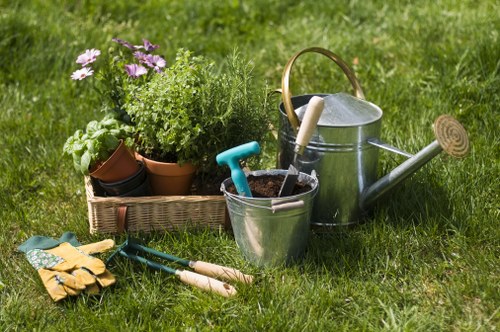Comprehensive Guide to Garden Maintenance in Temple
Maintaining the serene and sacred environment of a temple garden is essential for both aesthetics and spiritual ambiance. Proper garden maintenance in temple settings ensures that the space remains beautiful, welcoming, and conducive to meditation and worship. This article delves into the various aspects of garden maintenance in temple, offering insights and practical tips to keep temple gardens flourishing year-round.
Temple gardens are not just ornamental; they play a significant role in enhancing the spiritual experience of devotees. A well-maintained garden reflects the dedication and reverence of the temple community, providing a tranquil space for reflection and connection with the divine.
Regular upkeep involves a combination of horticultural practices, aesthetic arrangements, and sustainable techniques. By understanding the unique requirements of temple environments, maintenance teams can create a harmonious and inviting garden space.

Key Aspects of Temple Garden Maintenance
Effective garden maintenance in temple grounds encompasses several key elements. Each aspect contributes to the overall health and beauty of the garden, ensuring it remains a place of peace and devotion.
1. Regular Cleaning and Debris Removal: Keeping the garden free of litter, fallen leaves, and other debris is fundamental. Regular cleaning not only maintains visual appeal but also prevents the accumulation of waste that can harm plant health.
2. Pruning and Trimming: Proper pruning of trees, shrubs, and other plants promotes healthy growth and maintains the desired shape and size. Trimming ensures that plants do not obstruct walkways or interfere with temple structures.

Irrigation and Water Management
Water is a critical component of garden health. Implementing an efficient irrigation system ensures that plants receive the right amount of water without wastage. Proper water management also prevents issues like root rot and soil erosion.
In temple gardens, decorative water features such as fountains or ponds may be present. Maintaining these features requires regular cleaning and monitoring to ensure water quality and functionality.
Using sustainable practices like rainwater harvesting can further enhance water management efforts, aligning with eco-friendly principles often embraced by temple communities.

Fertilization and Soil Health
Healthy soil is the foundation of a vibrant garden. Regular fertilization provides essential nutrients that support plant growth and resilience. Organic fertilizers are often preferred in temple settings to maintain a natural and pure environment.
Soil testing helps in understanding the nutrient composition and pH levels, allowing for tailored fertilization strategies. Incorporating compost and mulch can also improve soil structure and moisture retention.
Maintaining soil health is a continuous process that requires attention to detail and an understanding of the specific needs of temple garden flora.

Pest and Disease Control
Protecting the garden from pests and diseases is crucial for preserving plant health. Integrated Pest Management (IPM) strategies are effective in minimizing chemical usage while controlling unwanted pests.
Regular monitoring and early detection of pest infestations or disease outbreaks allow for prompt and targeted interventions. Encouraging natural predators and maintaining plant diversity can also deter pest populations.
Educational programs for maintenance staff on identifying and managing common pests and diseases contribute to a proactive approach in garden care.

Seasonal Planting and Preparation
Adapting garden maintenance practices to seasonal changes ensures year-round beauty and health. Spring planting introduces new flora, while fall preparation prepares the garden for colder months.
Choosing plant species that thrive in the local climate and specific temple environment supports sustainable growth. Seasonal pruning, mulching, and protection against frost are essential tasks during different times of the year.
Adjusting maintenance schedules to align with seasonal needs helps in maintaining a vibrant and resilient garden.

Specialized Maintenance for Temple Gardens
Temple gardens often feature sacred plant species and specific aesthetic elements that require specialized care. Understanding the cultural and spiritual significance of these plants enhances their preservation.
Sacred Plant Species Care: Plants like tulsi, neem, and other culturally significant flora require particular attention. Ensuring their health and vitality honors their symbolic importance.
Arrangements for Festivals and Events: During religious festivals, the garden may host special decorations or temporary arrangements. Coordinating maintenance activities to accommodate these events maintains the garden's functionality and beauty.

Aesthetic Considerations and Symmetry
Maintaining aesthetic harmony and symmetry is often a priority in temple gardens. Well-planned layouts, balanced plant arrangements, and thoughtfully placed features contribute to a visually pleasing environment.
Using geometrical patterns and incorporating elements like benches, statues, and pathways enhances the garden's spiritual ambiance. Regular assessments ensure that the garden remains aligned with the temple's aesthetic vision.
Collaborating with landscape architects and horticulturists can provide valuable insights into effective garden design and maintenance strategies.

Hiring Professional Garden Maintenance Services
Engaging professional garden maintenance services can significantly benefit temple gardens. Experts bring specialized knowledge, experience, and resources that ensure high-quality upkeep.
Benefits of Professional Services: Professionals offer comprehensive care, from routine maintenance to handling complex horticultural tasks. Their expertise ensures that the garden remains healthy and aesthetically pleasing.
Choosing the Right Garden Maintenance Company: Selecting a service provider with experience in temple garden maintenance is crucial. Evaluating their portfolio, understanding their approach, and ensuring they align with the temple's values are key factors in making the right choice.

Training and Support for Maintenance Staff
Investing in training programs for maintenance staff enhances their skills and knowledge. Continuous education on the latest gardening techniques, pest control methods, and sustainable practices ensures effective garden care.
Supportive management and access to necessary tools and resources empower staff to perform their duties efficiently, leading to better garden health and aesthetics.
Fostering a team-oriented environment where staff can share ideas and collaborate contributes to the overall success of garden maintenance efforts.

DIY Maintenance Tips for Temple Gardens
For temples with limited resources, implementing DIY garden maintenance strategies can be effective. Simple practices can make a significant difference in maintaining garden health and beauty.
- Regular Weeding: Keeping the garden free of weeds reduces competition for nutrients and maintains a tidy appearance.
- Composting: Creating a compost system recycles organic waste and enriches the soil naturally.
- Natural Pest Control: Using homemade remedies and encouraging beneficial insects can manage pest populations without chemicals.
- Mulching: Applying mulch helps retain soil moisture, suppress weeds, and improve soil quality.
Implementing these DIY methods promotes sustainability and reduces maintenance costs while keeping the garden in optimal condition.

Sustainability Practices in Temple Garden Maintenance
Adopting sustainable practices in garden maintenance aligns with environmental stewardship. Sustainable methods ensure that the garden remains healthy without depleting natural resources.
Water Conservation: Implementing rainwater harvesting and drip irrigation systems minimizes water usage and promotes efficient irrigation.
Organic Gardening: Avoiding synthetic fertilizers and pesticides protects the ecosystem and maintains a natural environment conducive to spiritual practices.

Energy-Efficient Maintenance Techniques
Using energy-efficient tools and techniques reduces the environmental footprint of garden maintenance activities. Solar-powered lighting and manual gardening tools are examples of sustainable choices.
Optimizing maintenance schedules to minimize energy consumption and incorporating renewable energy sources support long-term sustainability goals.
Encouraging eco-friendly practices among maintenance staff fosters a culture of environmental responsibility within the temple community.

Conclusion
Effective garden maintenance in temple settings is a multifaceted endeavor that combines horticultural expertise, aesthetic planning, and sustainable practices. By focusing on key maintenance aspects, embracing professional services, and implementing DIY strategies when necessary, temples can maintain beautiful and spiritually enriching garden spaces.
Investing in garden maintenance not only enhances the visual appeal of the temple but also supports the well-being of its visitors by providing a peaceful and harmonious environment.
Ready to elevate your temple garden? Contact us today to learn more about our garden maintenance services tailored to your unique needs.